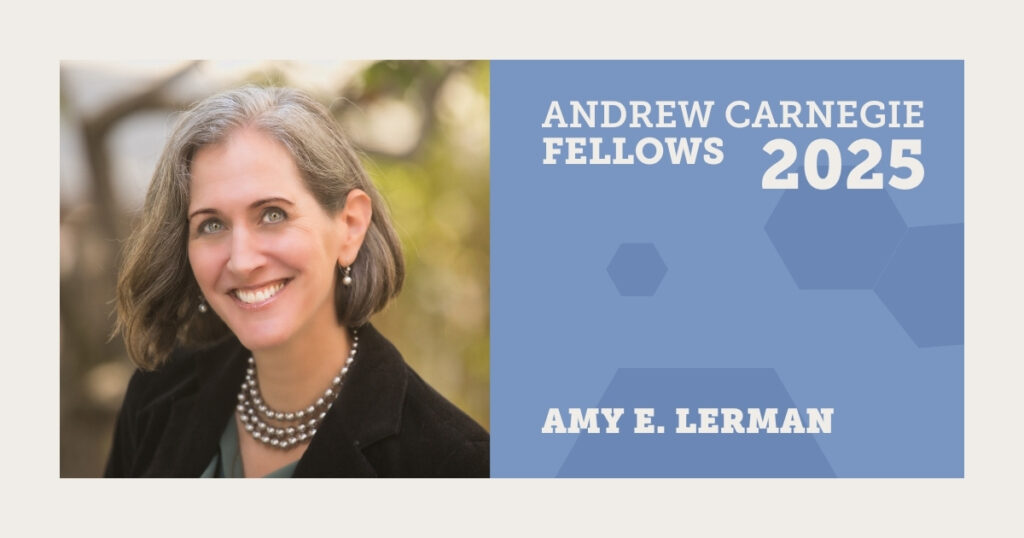Possibility Lab’s Amy E. Lerman Named 2025 Carnegie Fellow to Advance Research on Deliberative Democracy and Polarization

The Possibility Lab at the UC Berkeley Goldman School of Public Policy is thrilled to announce that executive director Amy E. Lerman has been awarded the prestigious 2025 Andrew Carnegie Fellowship. The fellowship will support Dr. Lerman and the Possibility Lab’s work on the role of public and deliberative engagement in reducing political polarization and strengthening democratic governance.
The Andrew Carnegie Fellows Program, established by the Carnegie Corporation of New York, supports scholars whose work addresses some of the most pressing challenges facing our society. This year’s cohort of 26 fellows was selected for their visionary research on the causes and consequences of political polarization in the United States—and the potential paths forward. Carnegie will commit up to $18 million to this effort over the three-year period.
“I was thrilled and honored to be given this amazing fellowship – while also fully recognizing that this award is not just about me, but really reflects the incredible work of my whole team at the Possibility Lab and our extraordinary partners in both government and communities across California,” said Dr. Lerman. “At a moment when our democracy is under immense strain—when polarization, distrust, and the dismantling of institutions are becoming increasingly normalized—this fellowship will provide critical support to the work we are doing together. I am so grateful that our applied scholarship aimed at bridging divides and promoting meaningful civic dialogue resonated with the Carnegie selection committee. With Carnegie’s support, we are excited to continue piloting new methods for civic engagement that can bring more diverse community perspectives into public policymaking.”
Lerman’s project is titled “Exploring the Impacts of Deliberative Engagement on Polarization in America,” and will investigate how participatory democratic practices—such as citizen assemblies, deliberative forums, and other community-centered engagements—can foster empathy, reduce division, and build shared understanding across ideological lines.
“Through these fellowships, Carnegie is harnessing the unrivaled brainpower of our universities to help us to understand how our society has become so polarized,” said Carnegie president Dame Louise Richardson. “Our future grantmaking will be informed by what we learn from these scholars as we seek to mitigate the pernicious effects of political polarization.”
Lerman’s project to be implemented through the Possibility Lab aims to design, pilot, and evaluate new methods for deliberative democracy and co-governance that can directly inform public policy. Specifically, over the next two years, Specifically, over the next few years, the Lab will partner with the Governor’s Office of Land Use and Climate Innovation (LCI) and California Strategic Growth Council on their regional Catalyst Convenings. These convenings will provide a venue where a diverse group – including state and local government leaders, community-based organizations, tribal representatives, and local residents—can come together in moderated, face-to-face deliberations and also through digital platforms to discuss pressing challenges and promising solutions related to land use, climate, and the environment. Ultimately, the goal of these convenings is to produce a set of recommendations that can inform the state’s strategic plan and policy goals. More broadly, the project aims to learn how these types of deliberative engagements can reduce polarization and increase efficacy and trust, while also producing better public policies that serve all Californians. The hope is that the findings can be replicated by other government departments and agencies, scaled to other states, and iterated on to strengthen our democracy.
The winning proposals approach polarization through a wide array of disciplines and methods. Projects include analyzing the causes of the increasing political divides between men and women; assessing where Americans find common ground when it comes to their health; and understanding how partisan media, consultants, and tabloid entertainment industries are driving polarization for short-term profits, among other areas of research.
Lerman joins a distinguished group of past Carnegie Fellows whose work has informed national debates, shaped policy, and earned honors such as the Pulitzer Prize, National Book Award, and Nobel Prize.
To learn more about the Andrew Carnegie Fellows Program and the 2025 class, visit carnegie.org.

